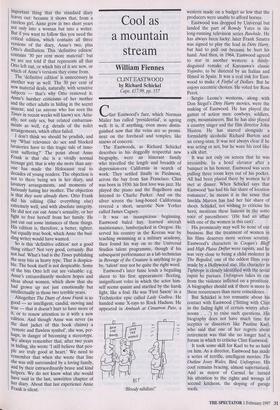Cool as a mountain stream
William Fiennes
CLINT EASTWOOD by Richard Schickel Cape, £17.99, pp. 557 Clint Eastwood's face, which Norman Mailer has called 'presidential', is ageing well. It is, if anything, even more distin- guished now that the veins are so promi- nent on the forehead and temples, like sinews of concern.
The Eastwoods, as Richard Schickel describes in his doggedly respectful new biography, were an itinerant family who travelled the length and breadth of depression-era California in search of work. They settled finally in Piedmont, across the bay from San Francisco. Clint was born in 1930: his first love was jazz. He played the piano and the flugelhorn and listened to Charlie Parker. And on the silver screen the long-boned Californian revered a short, neurotic New Yorker called James Cagney.
It was an inauspicious beginning. Eastwood baled hay, learned aircraft maintenance, lumberjacked in Oregon. He served his country in the Korean war by teaching swimming at a military academy, then found his way on to the Universal Studios talent programme, though if his subsequent performance as a lab technician in Revenge of the Creature is anything to go by, 'talent' may not be quite the right word. Eastwood's later fame lends a beguiling sheen to his first appearances: fleeting, insignificant roles in which the actor him- self seems quaint and startled by the harsh light, like a foal. He was 'First Saxon' in a Technicolor epic called Lady Godiva. He handed some X-rays to Rock Hudson. He appeared in Ambush at Cimarron Pass, a Bloody nihilists!' western made on a budget so low that the producers were unable to afford horses.
Eastwood was dropped by Universal but landed the part of Rowdy Yates in the long-running television series Rawhide. He has always been lucky: later Frank Sinatra was signed to play the lead in Dirty Harry, but had to pull out because he hurt his hand. And then, in 1964, Eastwood agreed to star in another western: a thinly- disguised remake of Kurosawa's classic Yojimbo, to be directed by an Italian and filmed in Spain. It was a real risk for East- wood to make A Fistful of Dollars. But he enjoys eccentric choices. He voted for Ross Perot.
Sergio Leone's westerns, along with Don Siegel's Dirty Harry movies, were the making of Eastwood. He has played the gamut of action men: cowboys, soldiers, cops, mountaineers. But he has also played a country singer and the film director John Huston. He has starred alongside a formidably alcoholic Richard Burton and an orang-utan. It was not always clear if he was acting or not, but he wore his cool like a silk shirt.
It was not only on screen that he was irresistible. In a hotel elevator after a banquet in his honour, Eastwood was seen pulling three room keys out of his pocket. All had been placed there by women he'd met at dinner. When Schickel says that Eastwood 'has had his fair share of location romances', he means it in the sense that Imelda Marcos has had her fair share of shoes. Schickel, not wishing to criticise his hero, mentions these liaisons in the sotto voce of parentheses: '(He had an affair with one of the women in this cast)'.
His promiscuity may well be none of our business. But the treatment of women in his films deserves more serious scrutiny. Eastwood's characters in Coogan's Bluff and High Plains Drifter were rapists, and he was very close to being a child molester in The Beguiled, one of the oddest films ever made by a Hollywood star. His character in Tightrope is closely identified with the serial rapist he pursues. Unforgiven takes its cue from the violence inflicted on a prostitute. A biographer should ask if there is more to these recurrences than mere coincidence.
But Schickel is too romantic about his contact with Eastwood (Sitting with Clint in the fading light of certain wintry after- noons . . .') to raise such questions. His biography does not have much time for sceptics or dissenters like Pauline Kael, who said that one of her regrets about retirement was that she no longer had a forum in which to criticise Clint Eastwood.
It took some skill for Kael to be so hard on him. As a director, Eastwood has made a series of terrific, intelligent movies: The Outlaw Josey Wales, Bird, Unforgiven. His cool remains bracing, almost supernatural. And as mayor of Carmel he turned his attention to the rights and wrongs of second kitchens, the sloping of garage roofs.


























































 Previous page
Previous page